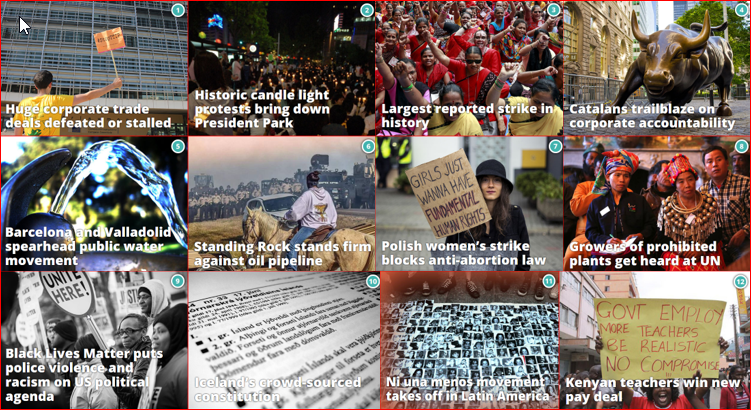12 victories that inspired us in 2016
12.1
Originally published at http://12victories.tni.org/. Republished with permission from TNI.
Years of campaigning, and growing public awareness of the economic and social costs of corporate 'free trade' agreements have started to turn the tide. The Trans-Pacific Partnership (TPP) between the US and Pacific Rim countries died in 2016 after every US presidential candidate expressed their opposition. The Transatlantic Trade and Investment Partnership (TTIP) is on a lifeline and the Comprehensive Economic and Trade Agreement (CETA) between the EU and Canada faces major hurdles if it is to be finally ratified. (more)
12.2
A series of million-strong protests, culminating in an incredible 2.3 million mega-protest led its parliament to vote to impeach the South Korean President Park Geun-hye. The protests erupted after media revelations that the President had facilitated misuse of public funds, and allowed a friend and business ally, Choi Soon-sil to extract donations from the country's largest corporate conglomerations in exchange for special treatment. (more)
12.3
Around 180 million workers in India on 2 September went on strike demanding increases in minimum wage, social security benefits for temporary workers, and an end to privatization of state companies. The strike brought together organised and unorganized workers, public and private sectors, central and state government departments. The strike is evidence of growing public anger against the pro-corporate policies of the Modi Government. (more)
12.4
In November, the Catalan Parliament agreed to create a ground-breaking centre to monitor transnational company activities abroad, which could even have the power to impose penalties on TNCs involved in corporate abuses. It could set a precedent for other governments to adopt and mirrors international efforts at the UN Human Rights Council to develop a ‘legally binding instrument’ to regulate TNCs’ activities. (more)
12.5
Barcelona and Valladolid both voted to remunicipalise their water services, marking a growing global trend in which more than 240 cities have brought privatised water back under public control. A powerful new network of 10 Spanish cities has formed that is committed to running water services on the principles of solidarity, environmental sustainability, mutual cooperation, collective access, equity and democratic control. (more)
12.6
On 1 April 2016, the Standing Rock Sioux tribe in North Dakota established the Sacred Stone Camp to protest the North Dakota Access Pipeline, as it threatened the Missouri River, their only water supply and breached various Federal treaty obligations with the Sioux nation. The camp has drawn hundreds of thousands of ‘water protectors’, who have faced off against repeated police violence, and has become the the largest gathering of Native Tribes in the past 100 years. In December, the US Army Corps of Engineers, under intense public pressure, denied a permit to build under the river - a temporary but important victory. (more)
12.7
Tens of thousands of Polish women in 60 cities boycotted work in October, forcing government offices, universities and schools to close their doors. The protests were against announced plans to convert Poland’s already highly-restrictive laws to a total punitive ban. The scale of the protests have forced the Polish government to back down. (more)
12.8
Long marginalised and oppressed by governments in the failed 'war on drugs', movements of farmers involved in the production of illicit crops mobilised in 2016 to ensure their perspectives were heard at the UN General Assembly Special Session on Drugs (UNGASS). In an historic “Heemskerk Declaration”, they demanded an end to forced eradication and asked to be involved in all stages of drug policies and development to ensure they respect human rights and support community well-being. (more)
12.9
The Black Lives Matter began in 2013 after the acquittal of George Zimmerman in the shooting death of African-American teen Trayvon Martin. Since then it has grown into a major national movement. In 2016, it continued to powerfully denounce ongoing police killings and systemic racism within in the US, forcing the issue into the US presidential campaign. In the first half of July, there were at least 112 protests in 88 American cities. Through collective consultations, the movement also presented a detailed platform in 2016 outlining core demands as well as actions that could be taken at local, state and federal level to begin to address systemic racism. (more)
12.10
A crowd-sourced constitution, approved by voters in 2012, could finally be approved in Iceland in the coming year, as five political parties committed to make it happen within two years. The constitution includes clauses on environmental protection, emphasizes international human rights law and the rights of refugees and migrants, proposes redistributing the fruits of Iceland’s natural resources - notably fishing - and allows for citizens to propose and alter legislation. One of its foremost proponents, the Pirate Party, tripled its seats in October’s elections, coming third. (more)
12.11
The 'Ni una menos' (not one more death) movement started in 2015 in Buenos Aires as a spontaneous cry of dignity against all forms of violence against women. In 2016, it spread to all the big cities of the country, as well as Peru, Uruguay, Chile and Mexico. The actions have raised awareness of the high levels of sexual attacks and killings of women, and have garnered support from artists, journalists, sports stars and politicians. In Argentina, the pressure led the Supreme Court to establish a registry of feminicides. (m0re)
12.12
A series of strikes by Kenyan teachers in 2015 and 2016 finally secured an agreement in October that will see primary school teachers receiving a 25% pay increase. Struggles continue, however, against the growing introduction of private low-income schools, run by profit corporations like Bridge International Academies and Omega. (m0re)













